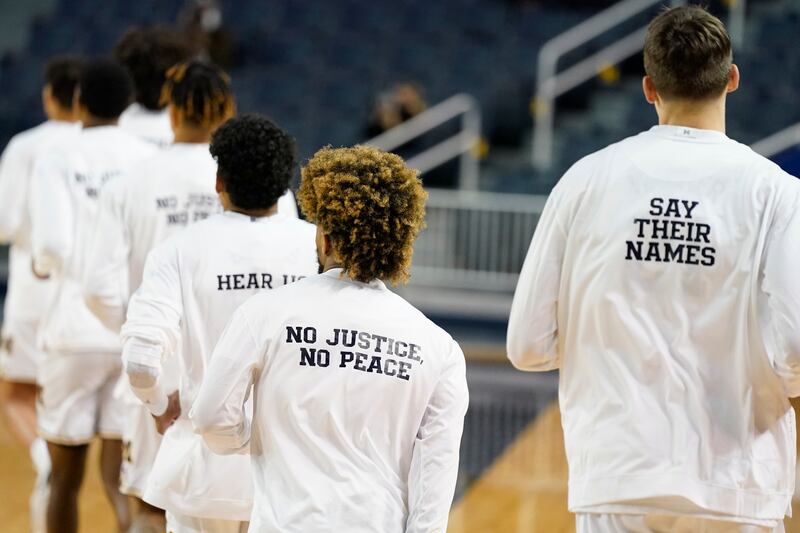Student-athletes have had plenty of reasons to be vocal this year. As college athletic programs try to navigate their seasons in the midst of the COVID-19 pandemic, and as issues of police brutality and the Black Lives Matter movement hit close to home for minority students, athletes face an unprecedented moment for expression.
But we might not be hearing the full story.
Many college sports programs — at private and public institutions alike — limit what their athletes can post on social media or convey to journalists. Sometimes those restrictions are written out explicitly in program handbooks, but they’re often unspoken.
This might not seem all that dangerous at first. After all, athletic programs have reputations to uphold. Keeping players in line means fewer publicity fiascos down the road. But given the controversies that have shaken college sports over the years, and given how long many scandals have persisted before coming to light, muzzling student-athletes is downright reprehensible.
We have proof of how damaging this can be. Reports of sexual abuse involving team doctors and coaches have emerged from Ohio State University, Michigan State University, and the University of Texas at Austin, among others. At OSU and MSU alone, hundreds of students endured wholly inappropriate conduct from figures they should have been able to trust. And tragically, the scope and duration of these scandals feed off of athletes’ inability to raise concerns.
Official guidance on college athlete speech ranges from uncomfortably overbearing to downright oppressive. On the keep-it-in-the-family side, Iowa State University and Kent State University advise that the coaches’ office is “the only place” for complaints. Florida State University and Oklahoma State University, meanwhile, lay out a far more ominous warning for their athletes: “Do not have a false sense of security about your rights to freedom of speech.”
When it comes to interactions with journalists, nearly all major public universities require those communications to be managed by athletic departments. Many institutions have outright banned players from speaking negatively at all about their athletic programs to members of the press. East Carolina University warned in imposing all-caps, “DO NOT COMPLAIN ABOUT THE COACHES, TEAMMATES OR THE UNIVERSITY.” At the University of Kentucky, an official handbook warns that there is “zero tolerance for athletes who speak negatively about their university.”
From less-insistent recommendations to discuss concerns with coaches to threatening to revoke credentials for unsavory comments, student-athletes find themselves in a system that’s designed to keep issues under wraps.
The Supreme Court has ruled that public employees retain free speech rights.
This is especially problematic in the age of COVID-19. Just weeks after the fall semester began, defensive lineman Jamain Stephens Jr. of California University of Pennsylvania died due to complications from the virus. His death came in the wake of an Ohio State study, in which several surveyed athletes eventually developed myocarditis — inflammation of the heart — after contracting COVID-19. With these early findings just now coming to light, players need to be able to voice their concerns about their universities’ public health practices.
Universities shouldn’t get to pick and choose when they treat their student athletes purely as students and when they treat them as functional employees who represent their schools to the public. Set aside the fact that this is legally questionable: The Supreme Court has ruled that public employees retain free speech rights. In any case, it’s wrong to infringe upon those rights.
There’s reason to be hopeful, however.
Universities, perhaps coming to accept this year’s tide of activism, haven’t yet punished a student journalist or athlete for flouting media policies during the 2020 season. After such highly-publicized scandals have cast an unflattering light on this culture of secrecy, it’s become clear that athlete dissidence is an invaluable preventative measure.
Issues within college athletic programs should be voiced when they first arise. If students are free to speak their minds, untold suffering could be avoided. But if universities continue to relegate their athletes to silence, we’ll continue to grapple with avoidable tragedies.
Fiona Harrigan is an Openness Fellow with Young Voices and a Research Assistant with the American Institute for Economic Research. Find her on Twitter: @Fiona_Harrigan.

